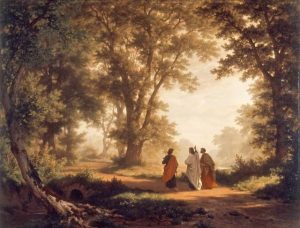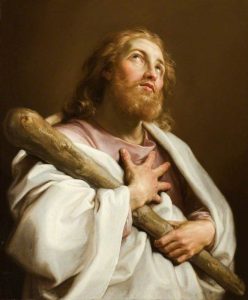
30 April 2017
3rd Sunday of Easter

Acts 2:14, 22-33
Psalm 15: 1-2, 5,7-11
1 Peter 1:17-21
The Gospel of Luke 24:13-35
Two of the disciples of Jesus were on their way to a village called Emmaus, seven miles from Jerusalem, and they were talking together about all that had happened. Now as they talked this over, Jesus himself came up and walked by their side; but something prevented them from recognising him. He said to them, ‘What matters are you discussing as you walk along?’ They stopped short, their faces downcast.
Then one of them, called Cleopas, answered him, ‘You must be the only person staying in Jerusalem who does not know the things that have been happening there these last few days.’ ‘What things?’ he asked. ‘All about Jesus of Nazareth’ they answered ‘who proved he was a great prophet by the things he said and did in the sight of God and of the whole people; and how our chief priests and our leaders handed him over to be sentenced to death, and had him crucified. Our own hope had been that he would be the one to set Israel free. And this is not all: two whole days have gone by since it all happened; and some women from our group have astounded us: they went to the tomb in the early morning, and when they did not find the body, they came back to tell us they had seen a vision of angels who declared he was alive. Some of our friends went to the tomb and found everything exactly as the women had reported, but of him they saw nothing.’
Then he said to them, ‘You foolish men! So slow to believe the full message of the prophets! Was it not ordained that the Christ should suffer and so enter into his glory?’ Then, starting with Moses and going through all the prophets, he explained to them the passages throughout the scriptures that were about himself.
When they drew near to the village to which they were going, he made as if to go on; but they pressed him to stay with them. ‘It is nearly evening’ they said ‘and the day is almost over.’ So he went in to stay with them. Now while he was with them at table, he took the bread and said the blessing; then he broke it and handed it to them. And their eyes were opened and they recognised him; but he had vanished from their sight. Then they said to each other, ‘Did not our hearts burn within us as he talked to us on the road and explained the scriptures to us?’
They set out that instant and returned to Jerusalem. There they found the Eleven assembled together with their companions, who said to them, ‘Yes, it is true. The Lord has risen and has appeared to Simon.’ Then they told their story of what had happened on the road and how they had recognised him at the breaking of bread.
The two disciples set out immediately
Once we have truly met the Risen One by partaking of his body and blood, we cannot keep to ourselves the joy we have experienced. The encounter with Christ, constantly intensified and deepened in the Eucharist, issues in the Church and in every Christian an urgent summons to testimony and evangelization. I wish to emphasize this… based on the words of Saint Paul: “As often as you eat this bread and drink the cup, you proclaim the Lord’s death until he comes” (1 Cor 11,26). The Apostle closely relates meal and proclamation: entering into communion with Christ in the memorial of his Pasch also means sensing the duty to be a missionary of the event made present in that rite. The dismissal at the end of each Mass is a charge given to Christians, inviting them to work for the spread of the Gospel and the imbuing of society with Christian values.
Saint John-Paul II, Ap. Letter Mane nobiscum Domine (Remain with us Lord)
Saints of the week
Mon 1 Saint Joseph the Worker
Tue 2 Saint Athanasius, Bishop, Doctor
Wed 3 St. James, Apostle, First Bishop of Jerusalem (Solemnity in our Diocese).
Psalter Week III
Next Sunday’s Readings
Acts of the Apostles 2: 14, 36-41.
Psalm 22: 1-6.
1 Peter 2:20-25. John 10:1-10
James the Apostle,
First Bishop of Jerusalem (3 May, in our Diocese)

St. James, son of Alpheus, normally shares the feast day with St. Phillip, but in our diocese of Jerusalem, where he is the principal patron, he has his own feast. He is commonly referred to as St. James “the Less” to distinguish him from St. James the Greater, brother of St. John and missionary Apostle who evangelized as far as modern day Spain. The pre-eminence of St James in the Church of Jerusalem can be attested in several passages of the Acts of the Apostles and the Letters of St. Paul. He is also the author of the New Testament Letter of St. James which shows him as a grave, meek, and calm mind, nourished with Old Testament Scriptures, prayerful man, devoted to the poor and resigned in persecution.
Cf. Catholic Encyclopedia, St. James the Less
NEWS
BBQ Parish Lunch 14 May 2017, All welcome. €10 suggested donation. Please sign up so we know how much meat to cook!
CARITAS PAPHOS: We need nοn-perishable food to help the poor in the Paphos area. Prayers and Donations welcomed.
Organ recital at Agia Kyriaki: Mon May 1st, 6pm. Collection to help the Hospice. All welcome.
Grand Day Out in Kyrenia: Fri 5 May, departing at 8am. €30 includes coach. Raffle. Call Mona 99494140, or Linda 99562387.
Archangel Michael Hospice: Volunteers needed in the areas of reception, nursing assistants and cafeteria. Contact Mona 99494140
Mass Times HERE
